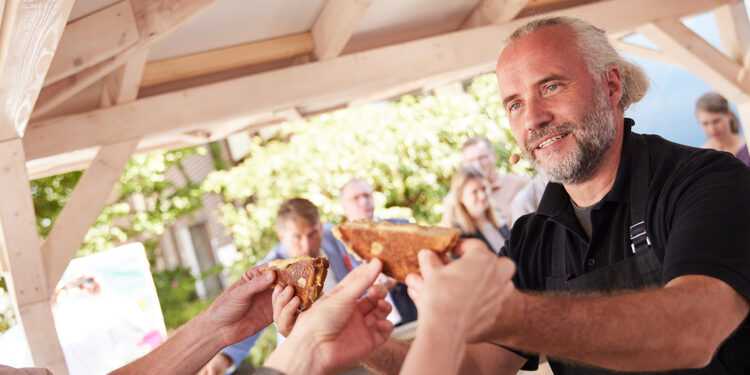“We want to offer our customers a complete and future-ready product range,” says Ingo Müller, CEO of the DMK Group. “By complementing our core range with our vegan cheese alternative, we are now able to offer our customers the option of serving consumers of vegan products as well. Despite quite difficult conditions in the food market – keyword “inflation” – we have achieved a successful start with our vegan dessert line. Here we score with the superior taste of the products – this is exactly where we now want to pick up in the cheese segment.”
The vegan cheese alternative is named “Velander” – both in allusion to the product’s vegan characteristics and its connection to agriculture and its home in a cooperative enterprise of farmers.
Focus on application occasions
Thanks in particular to different recipes for cold and hot application, the vegan DMK cheese variant offers clear advantages for customers and consumers compared to the current market standard. “A plant-based cheese variant that corresponds to classic cheese in taste and texture is many times more challenging to develop than, for example, oat drinks or other plant-based segments. As experienced cheese experts, we are therefore exactly the right partner to also deliver the next generation of plant-based cheese alternatives. This clearly sets our product apart from the competition and aims to optimally serve the needs of customers. The user target group such as chefs or industrial customers in addition to taste aspects do not want to forego familiar characteristics such as browning and melting behaviour with the vegan cheese alternative, for example. This is exactly where we come in with our Velander,” says Müller.
The vegan newcomer is produced at DMK’s largest cheese location in Edewecht, Lower Saxony. Where more than 3 million litres of milk are processed into cheese every day, the company has created its own additional production area. The Velander was developed by DMK experts based on decades of cheese expertise. While DMK is just starting out with plant-based cheese variants, the company claims that it is continuing to expand in the classic self-service cheese sector with its Milram brand: sales in the food retail sector have increased more than fivefold since 2012. This know-how pays off. The result is a product that is clearly convincing not only in market research, but also in customer and consumer feedback and meets a market with annual double-digit growth rates.




